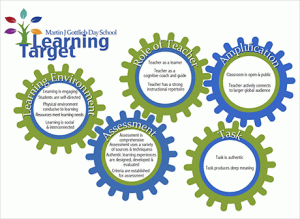We Have Student-Led Conferences. Why Not Teacher-Led Evaluations?
Modeled on student-led conferences, teacher-led evaluations support teachers as learners, motivate risk taking, and recognize the necessity for personalization.
Your content has been saved!
Go to My Saved Content.As the ideas associated with growth mindset continue to spread, schools are envisioning and experimenting with new forms of assessment that highlight the growth process and the individual path of each learner. One example of this is the student-led conference, which is quickly replacing the outdated model of parents and teachers discussing a student while he or she is not present. In the student-led conference, learning takes center stage. Students prepare by reflecting on their academic and social growth, work habits, and behavior. Together with their teachers, they set goals that are personally meaningful and achievable.
At the Martin J. Gottlieb Day School, we are working toward creating a culture of learning that includes students, teachers, and parents. We believe that, when it comes to learning, what is good for students is good for teachers, and vice versa. When we adopted the student-led conference (SLC) model, we did so because we believed in the core values of student voice and ownership, ongoing assessment, and the importance of the reflective process. Students and parents, skeptical at first, quickly realized the benefits of this type of conference, and the SLC became the school's new normal.
In contrast, our teachers were still being formally observed and evaluated by a twice-yearly, high-stakes, model lesson. Teachers dreaded this inauthentic "show," some even bribing their students to behave. The process did not support growth nor accurately encompass the depth and breadth of a teacher's work throughout the year. We decided to experiment with adopting a teacher-led conference (TLC) based on the same core values that we embrace for students.
Why Should Schools Upgrade Teacher Evaluation?
It is well documented in the research on teachers' professional growth that the biggest challenge is not learning about a new practice but rather the implementation of that new practice in the classroom. In order to become better, teachers need a supportive environment that provides the opportunity to experiment, time and space to reflect, and meaningful feedback. Failure is part of the long-term growth process, and teachers must feel safe to try things in their classrooms and then reflect and refine as they move toward mastery. The old-school model of teacher evaluation focuses on teaching as opposed to learning. It does not encourage goal setting, reflection, or stretching oneself to attempt that which is new and challenging. Teacher-led evaluation, in contrast, exists to support teachers as learners, motivate risk taking, and recognize the necessity for personalization.
How One School Changed the Model
At the Martin J. Gottlieb Day School, we started by creating a target designed by a committee of teachers to make explicit what we believed high-quality teaching and learning should look like. Each separate area, represented by a cog, has an associated rubric that outlines steps toward an end goal of what, for example, "learning is engaging" would look like in terms of classroom practice. Teachers were asked to self-assess using the target and define a personal plan for professional growth. As part of the process, each teacher was required to observe another teacher, as well as have one of his or her own lessons recorded on video for self-evaluation.

Teachers are responsible for documenting their learning and compiling artifacts that show evidence of growth (photos, videos, student work, etc.). During twice-yearly meetings with an administrator, teachers share selected artifacts and reflect openly on successes, works in progress, and next steps. Specific prompts for discussion include:
- What are my successes?
- Is there room for improvement?
- What artifacts do I have as evidence of my learning?
- What tools or resources do I need to continue my professional growth on the Learning Target continuum?
Take a look at these examples of teacher-created presentations and sample artifacts through the lens of what type of thinking and reflection is required:
Feedback for the teacher-led conference is provided in narrative format, as opposed to a checklist scale of "distinguished, good, etc." and contains meaningful suggestions, as well as questions designed to elicit deeper thought. Administrators, with their whole-school perspective, are able to connect the dots in helping teachers find resources and colleagues who are on a similar path or have expertise to share.
Most teachers prefer this form of evaluation, despite the fact that it requires much greater preparation than simply sharing a lesson plan and teaching a model lesson. The focus on learning and growth, the personalized goals, and the opportunity to reflect and receive feedback and support make the process valuable. Much like the student-led conference, teacher-led evaluation meets each teacher where he or she is and recognizes that learning is not one-size-fits-all.
How can other schools tinker with upgrading the process of teacher evaluation? What does your school's teacher evaluation process communicate about the school's core values? Are teachers allowed to be learners and risk takers, or are they acknowledged and rewarded for sticking to what worked in the past? Is teacher evaluation tied explicitly to professional learning and student outcomes, or is it a once- or twice-yearly show put on for the evaluator?
